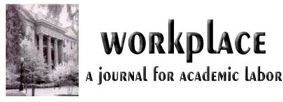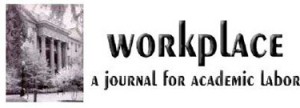Call for Papers:
Graduate Studies and the Academic Labor Market
Special Issue of Workplace: A Journal for Academic Labor 2012
Guest Editors: Bradley J. Porfilio, Julie A. Gorlewski, and Shelley J. Jensen
Workplace invites and authors to submit papers for a special issue on Graduate Studies and the Academic Labor Market. What are the futures of the academic labor market for graduate students? Or more to the point, is there a future in academic labor for graduate students? Even a casual glance at The Chronicle of Higher Education and, in Canada, at the CAUT Bulletin and University Affairs, suggests a shrinking job market for PhDs. In some disciplines, academic careers have all but disappeared. Post-PhDs are increasingly tracked or streamed into adjunct and sessional appointments, most of which are dead-end and even on full time bases may amount to less than $25,000 per year. This “income” is oftten typically annulled by student loan payments; indeed, the income to debt ratio for post-PhDs adds to a heavy burden of anxiety. We readily romanticize the life of the intellectual, but – more and more – this life does not put food on the table. Food banks are becoming more and more common on university grounds and the lines are not limited to students.
- What is the nature of this phenomenon in higher education?
- What do these trends mean for the future of education and learning beyond mere technical training?
- How do economic hardships affect scholarly pursuits?
- How might graduate students reclaim their futures in the professoriate?
- What roles exist for the scholar activist – both novice and veteran?
- What other questions we should be asking?
The editors request abstracts for papers by September 15, 2012, with full drafts due by December 15, 2012.
For more information and due dates contact Brad Porfilio (porfilio16@aol.com)

 Follow
Follow

